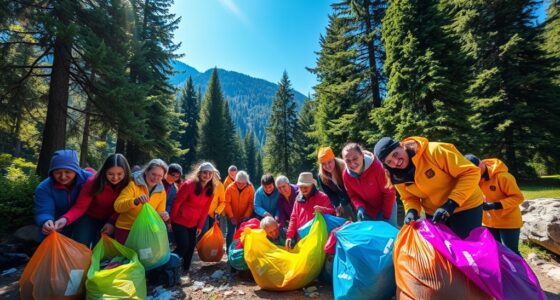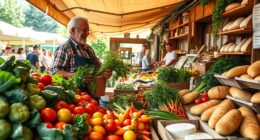Explore the sustainable wine routes in the Okanagan Valley, where many wineries prioritize eco-friendly practices like organic farming, water conservation, and renewable energy use. You can visit vineyards that focus on biodiversity, natural pest control, and eco-conscious visitor experiences. These vineyards support local communities and reduce their environmental impact through innovative initiatives. If you want to discover more about how these wineries are shaping a greener future, keep exploring these inspiring destinations.
Key Takeaways
- Many wineries in the Okanagan Valley adopt eco-friendly practices like organic farming, biodynamic methods, and biodiversity preservation along their routes.
- Sustainable wine routes highlight wineries utilizing renewable energy, water conservation, and eco-packaging to reduce environmental impact.
- Visitors can experience eco-conscious tourism through nature walks, bike tours, and responsible vineyard visits promoting environmental awareness.
- Collaborative efforts in the region focus on climate-smart agriculture, soil health, and resource management to ensure long-term sustainability.
- Educational signage and guided tours often emphasize vineyard conservation, biodiversity, and the importance of sustainable winemaking practices.
The Rise of Sustainable Winemaking in the Okanagan

Sustainable winemaking has gained significant momentum in the Okanagan Valley as producers recognize the importance of environmental responsibility. You’ll see wineries adopting practices that bolster climate resilience, helping vineyards withstand unpredictable weather patterns. Water conservation is a key focus, with many producers implementing efficient irrigation systems to reduce water use without sacrificing quality. These efforts not only protect local water resources but also ensure the longevity of the vineyards amid changing climate conditions. By prioritizing eco-friendly techniques, you’re supporting a movement that balances productivity with environmental health. Additionally, implementing solar energy solutions with high efficiency can power winery operations sustainably, further reducing their carbon footprint. The adoption of regulatory compliance measures ensures that these sustainable practices meet current legal standards, fostering trust and transparency. As a visitor or enthusiast, you’ll notice how these sustainable practices are shaping the region’s reputation, demonstrating that responsible winemaking can go hand in hand with producing exceptional wines. Embracing advanced data analytics can help wineries optimize their resource management and improve overall sustainability efforts. Additionally, implementing high-quality projectors with accurate color rendering can enhance tasting room presentations and vineyard tours, creating immersive experiences that highlight the region’s dedication to innovation and sustainability.
Key Wineries Committed to Eco-Friendly Practices

Many wineries in the Okanagan Valley are leading the way with eco-friendly practices that demonstrate their commitment to sustainability. They prioritize eco friendly packaging, using recycled and biodegradable materials to reduce waste. Water conservation is also a key focus, with wineries implementing drip irrigation and recycling water to minimize usage. These efforts help lower their environmental footprint while maintaining quality. Here’s a quick overview:
| Wineries | Eco-Friendly Initiatives |
|---|---|
| Summerhill Pyramid | Solar power, organic farming, eco packaging |
| Quails’ Gate | Water recycling, minimal packaging |
| Tantalus Vineyards | Water conservation, composting, eco packaging |
| Mission Hill | Solar energy, eco packaging, water efficiency |
Exploring the Green Initiatives Behind the Vineyards

Behind the scenic rows of the Okanagan Valley vineyards, wineries are actively implementing innovative green initiatives that reduce environmental impact. You’ll notice efforts to enhance vineyard biodiversity, encouraging a variety of native plants and wildlife that naturally balance the ecosystem. This diversity helps protect vines from pests and diseases without relying heavily on chemicals. Organic pest control methods are increasingly common, using natural predators, traps, and organic sprays to manage pests sustainably. These practices not only minimize chemical use but also promote healthier soil and water quality. By prioritizing vineyard biodiversity and organic pest control, wineries are creating resilient vineyards that thrive in harmony with their environment. Implementing sustainable farming techniques further supports these efforts by reducing resource consumption and waste. Additionally, many wineries are adopting eco-friendly practices such as solar energy and water conservation systems to further lessen their ecological footprint. Incorporating climate-smart agriculture strategies helps adapt to changing environmental conditions and ensures long-term vineyard health. These innovative approaches contribute to a more resilient and sustainable wine industry. Emphasizing environmental stewardship is also vital in maintaining the natural beauty of the valley for future generations. Your visit supports these efforts, helping sustain the valley’s natural beauty and wine-producing legacy.
Eco-Conscious Tasting Rooms and Visitor Experiences

As you visit the Okanagan Valley’s wineries, you’ll find that eco-conscious practices extend beyond the vineyards into the tasting rooms and visitor experiences. Many wineries prioritize sustainable packaging, using eco-friendly materials to reduce waste and environmental impact. You’ll notice efforts like reusable glassware, biodegradable cups, and minimal packaging for merchandise. Wineries also promote eco tourism activities, encouraging visitors to participate in guided nature walks, bike tours, and educational workshops that highlight sustainable practices. These experiences deepen your connection to the region’s commitment to environmental stewardship. Additionally, some wineries use eco-friendly materials in their construction and packaging to further minimize their environmental footprint. By choosing wineries that emphasize eco-conscious tasting rooms, you support sustainable tourism and help preserve the valley’s natural beauty for future generations. Your visit becomes more meaningful when aligned with these environmentally friendly initiatives. Moreover, many wineries are adopting technologies and practices that aim to reduce energy consumption, further demonstrating their dedication to sustainability. This holistic approach ensures that the entire winery operation aligns with principles of sustainability, fostering a healthier environment for all. In addition, some establishments incorporate renewable energy sources, such as solar panels, to power their facilities sustainably.
Organic and Biodynamic Farming Methods in the Region
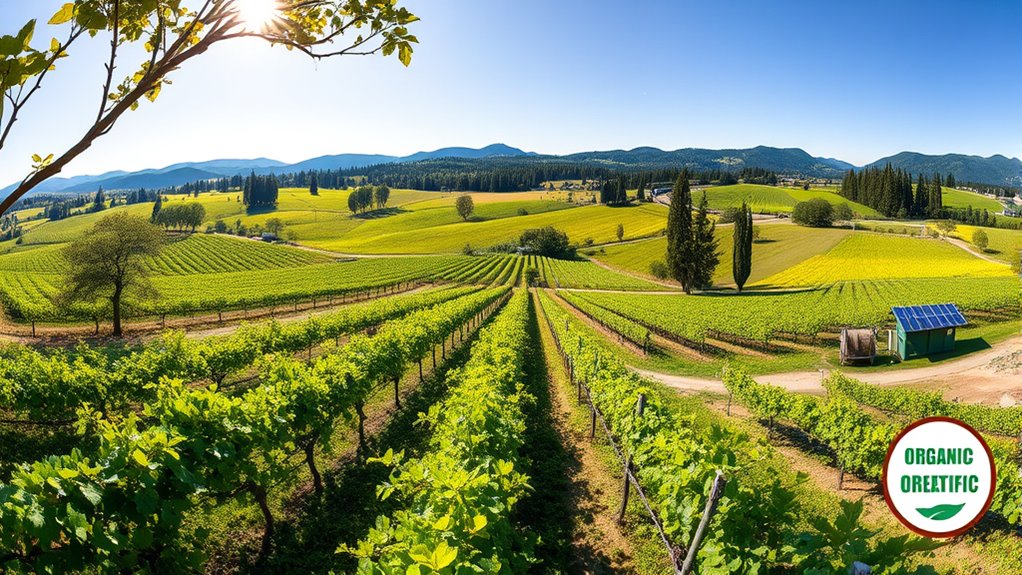
Many wineries in the Okanagan Valley prioritize organic and biodynamic farming methods to produce healthier grapes and wines. You’ll want to understand the specific organic certification standards they meet and how biodynamic practices, like lunar planting cycles, influence the vineyard. This approach not only benefits the environment but also enhances the unique character of the region’s wines.
Organic Certification Standards
Have you ever wondered how wineries in the Okanagan Valley achieve their reputation for sustainable and eco-friendly practices? It all starts with strict organic certification standards. Wineries must meet rigorous requirements to earn organic labels, ensuring they avoid synthetic chemicals and prioritize soil health. Even urban vineyards participating in wine tourism are held to these high standards, demonstrating their commitment to sustainability. Certification involves regular inspections and documentation, proving that practices like composting, natural pest control, and environmentally friendly farming are in place. This transparency builds trust with visitors and consumers alike. Additionally, adopting biodynamic farming methods can further enhance sustainability and soil vitality. By adhering to these standards, wineries not only protect the environment but also enhance their reputation, attracting eco-conscious tourists enthusiastic to support sustainable producers on their wine journeys.
Biodynamic Practices Explained
Building on the region’s commitment to sustainable practices, biodynamic farming offers an even deeper approach to nurturing the land in the Okanagan Valley. It’s rooted in biodynamic principles that view the vineyard as a self-sustaining ecosystem. You’ll notice a focus on enhancing vineyard biodiversity, encouraging a diverse array of plants, animals, and microorganisms to thrive naturally. This holistic method emphasizes composting, lunar cycles, and natural preparations to strengthen the soil and vines without synthetic inputs. By respecting ecological rhythms, biodynamic growers aim to create healthier, more resilient vineyards. This approach not only supports environmental sustainability but also enhances grape quality. As a visitor, you’ll see how these practices influence the unique character of wines from the region, highlighting the vineyard’s harmony with nature. Additionally, understanding the environmental impacts of agriculture can help appreciate how biodynamic methods contribute to reducing harmful pollutants and promoting ecosystem health, especially when integrated with renewable energy sources. Incorporating soil health management techniques further exemplifies the region’s dedication to sustainable viticulture, ensuring long-term vineyard vitality.
The Role of Renewable Energy in Sustainable Wineries
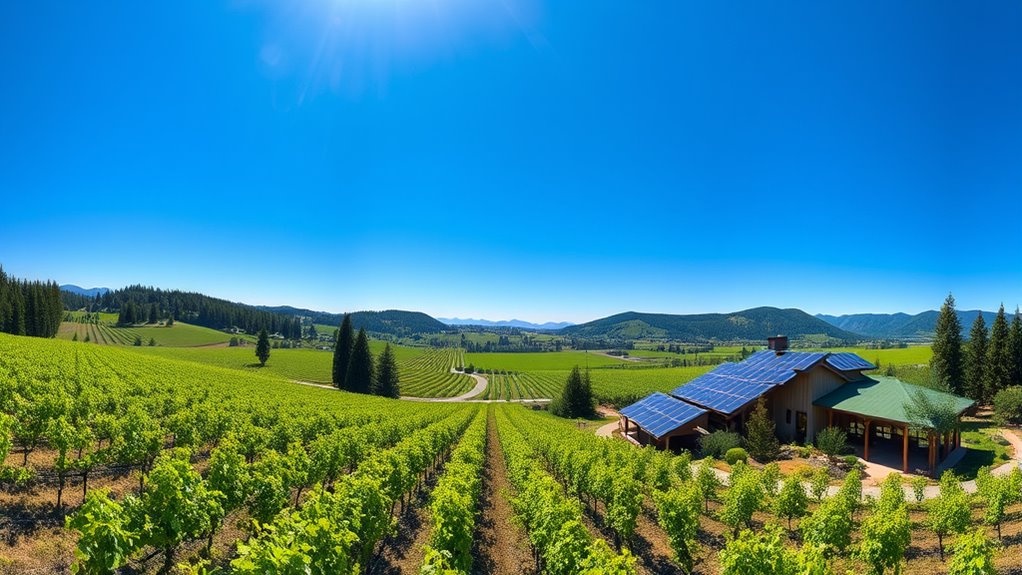
Renewable energy plays a crucial role in making wineries more sustainable by reducing their environmental impact. By harnessing solar panels, wind turbines, or other renewable sources, wineries lower their reliance on fossil fuels, decreasing carbon emissions. This shift not only supports eco-friendly practices but also helps wineries cut energy costs over time. Integrating renewable energy encourages the adoption of eco friendly packaging, as wineries aim to minimize waste and carbon footprint throughout their entire process. Using clean energy sources ensures that wine production aligns with sustainable principles, from vineyard management to bottling. Embracing these technologies demonstrates your commitment to environmental responsibility, appealing to eco-conscious consumers and strengthening the overall sustainability of the wine industry in the Okanagan Valley. Additionally, automation in business can optimize resource use and improve operational efficiency, further supporting sustainable practices.
Supporting Local Communities and Fair Practices
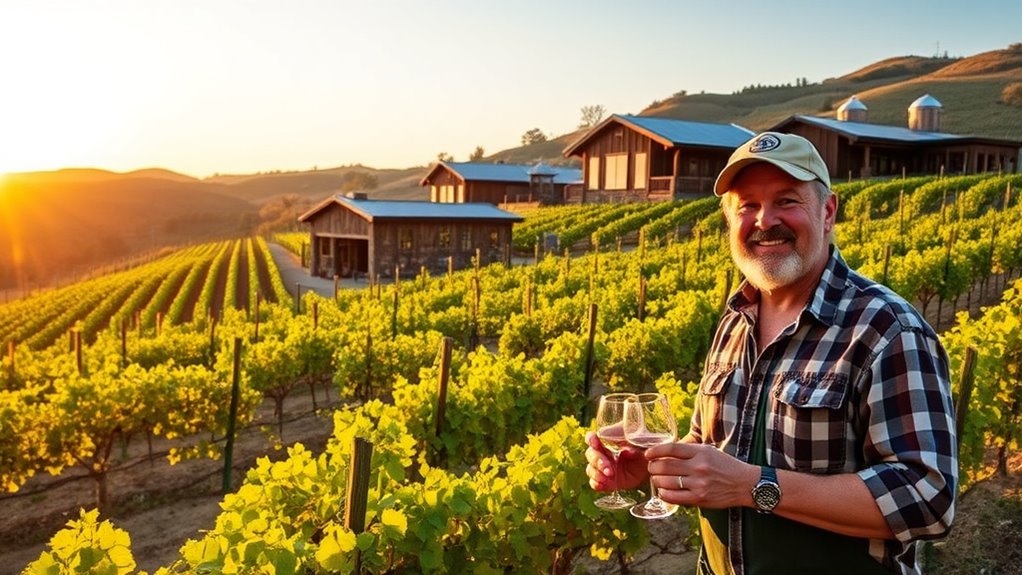
As you explore the wine routes, you’ll see how wineries prioritize fair wages and good labor practices. These efforts boost the local economy and foster stronger community ties. Many wineries also actively engage in initiatives that support the people and places around them.
Fair Wages and Labor
Have you ever wondered how wine producers in the Okanagan Valley support their local communities? They prioritize fair wages and uphold labor rights for their workers. By ensuring employees receive living wages, producers help improve workers’ quality of life and foster a more equitable industry. Upholding labor rights also means providing safe working conditions and respecting workers’ rights to organize. Many wineries commit to transparent pay practices and fair treatment, recognizing that sustainable success depends on happy, healthy employees. When you visit these wineries, you’re supporting a community that values its workers and champions fair labor standards. This approach not only benefits workers but also helps create a resilient, ethical wine industry that you can feel good about supporting.
Local Economic Impact
Ever wondered how wine tourism benefits the local economy in the Okanagan Valley? When you visit vineyards, your spending supports local businesses, creates jobs, and boosts community prosperity. Wine tourism encourages vineyard conservation, helping producers maintain land and reduce urban sprawl. This sustainable approach guarantees that wineries can invest in preserving their lands and promoting environmental health. Your participation in tastings, tours, and events directly contributes to economic growth while fostering fair practices within the industry. As a result, the region thrives through a balanced focus on profitability and ecological responsibility. Supporting local wineries not only enhances your experience but also sustains the community’s economy and natural landscapes for generations to come.
Community Engagement Initiatives
Community engagement initiatives in the Okanagan Valley play a vital role in supporting local residents and promoting fair practices within the wine industry. You’ll find many wineries actively involved in urban agriculture projects, encouraging community participation and sustainable food production. These efforts help strengthen local food systems and foster a sense of ownership among residents. Additionally, wineries are supporting eco tourism expansion by partnering with local communities, creating opportunities for residents to benefit economically while showcasing the region’s natural beauty. Such initiatives guarantee fair employment practices and promote environmental stewardship. By prioritizing community engagement, wineries build trust and contribute to a more resilient, inclusive local economy. Your involvement in these initiatives helps sustain the area’s vibrant culture and ensures that growth benefits everyone.
Mapping Your Eco-Friendly Wine Route Adventure
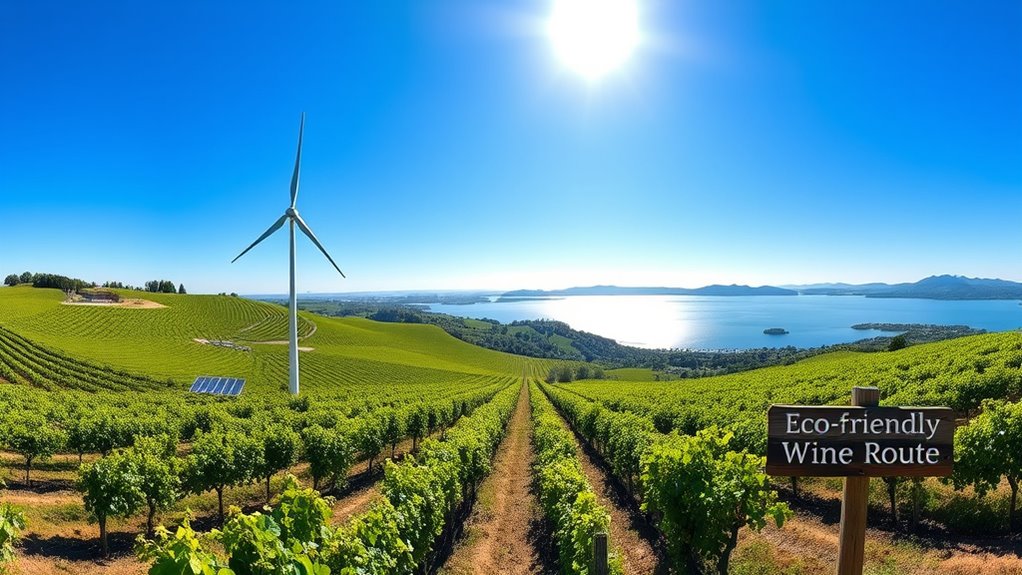
Creating an eco-friendly wine route in the Okanagan Valley starts with careful planning and mapping your journey. Focus on sustainable options that highlight vineyard biodiversity and promote responsible wine tourism. Use maps and resources to identify vineyards committed to eco-friendly practices. Planning your route helps minimize travel distances, reducing your carbon footprint and supporting local wineries.
| Vineyard Focus | Eco-Friendly Practices |
|---|---|
| Biodiversity | Organic farming, native plant conservation |
| Sustainable Travel | Carpooling, cycling routes |
| Water Use | Efficient irrigation systems |
| Waste Management | Recycling programs, composting |
Mapping your route guarantees you visit vineyards aligned with your sustainability goals, making your wine tourism experience enriching and environmentally responsible.
Tips for Responsible Tasting and Vineyard Visits
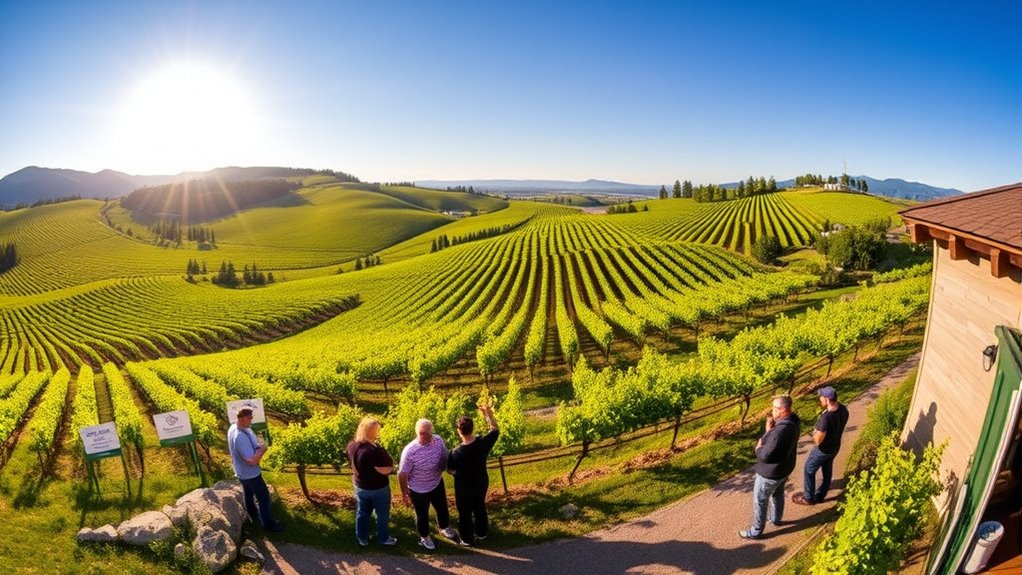
When visiting vineyards, it’s important to respect the environment by sticking to designated paths and avoiding waste. Practice responsible sampling by limiting your intake and not overindulging, so everyone can enjoy the experience. Being mindful of these tips helps safeguard the vineyard and ensures a positive visit for all.
Respect Vineyard Environment
To guarantee your visit to the vineyards is enjoyable for everyone and keeps the environment healthy, it’s important to practice responsible tasting and vineyard etiquette. Respecting vineyard biodiversity means staying on designated paths and avoiding trampling plants or disturbing wildlife. By doing so, you help preserve the natural balance of the vineyard ecosystem. Support eco-friendly pest control methods by not touching or removing insects or other creatures you encounter, as these natural pest management techniques protect the environment and maintain healthy vines. Keep noise levels down and avoid unnecessary waste, such as plastic bottles or food wrappers. Your mindful behavior ensures the vineyard remains a vibrant, sustainable space for future generations to enjoy, fostering a deeper connection with the land and its natural resources.
Practice Responsible Sampling
Ever wondered how to enjoy wine tastings without overindulging or harming the vineyard? Practicing responsible sampling is key to sustainable wine tourism. When visiting vineyards, pace yourself and sip mindfully, appreciating each wine’s unique qualities. Avoid excessive tasting that can lead to waste and discomfort. Remember, your actions impact vineyard ecology—pollution, soil erosion, and disturbance can harm the environment. Use designated tasting cups and dispose of waste properly. Respect vineyard guidelines and ask staff about best practices for responsible tasting. This not only preserves the vineyard’s health but also ensures a better experience for future visitors. By being conscious of your sampling habits, you help maintain the integrity of the Okanagan Valley’s wine routes and support sustainable wine tourism.
Future Directions for Sustainability in the Okanagan Wine Industry
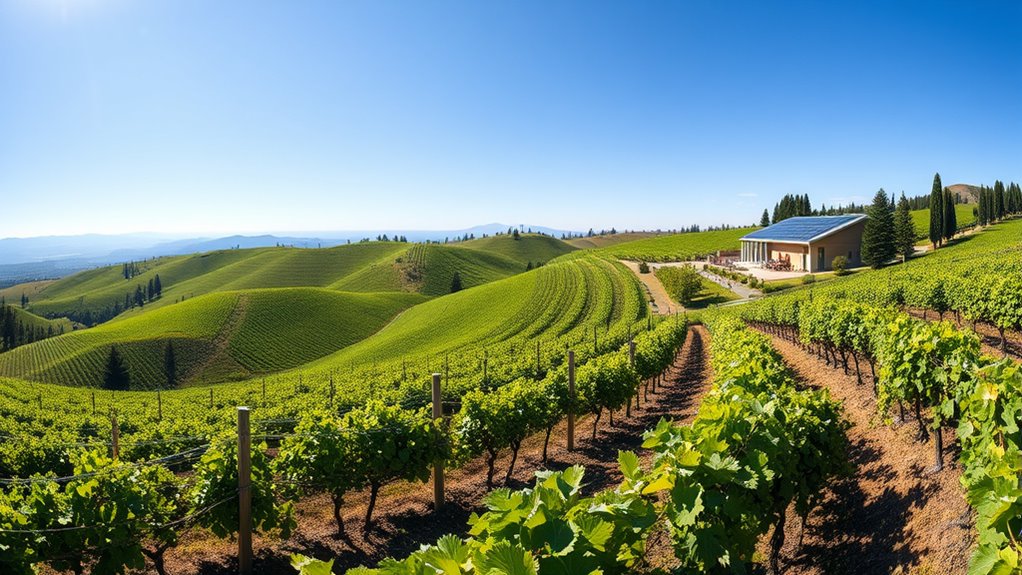
As the Okanagan Valley’s wine industry continues to grow, embracing sustainable practices becomes essential for its long-term success. Future directions focus on increasing climate resilience, helping vineyards adapt to changing weather patterns and extreme conditions. You can support this by adopting drought-tolerant grape varieties and implementing soil health strategies. Water conservation remains critical; vineyards are adopting innovative irrigation techniques like drip systems and soil moisture sensors to reduce water use. Collaborating with local communities and researchers will drive smarter resource management. Emphasizing renewable energy sources and waste reduction further enhances sustainability. By prioritizing climate resilience and water conservation, you ensure that the region’s wine industry not only survives but thrives amid environmental challenges. This proactive approach secures a sustainable future for Okanagan wines.
Frequently Asked Questions
How Do Sustainable Practices Impact Wine Quality in the Okanagan?
Sustainable practices directly boost wine quality by promoting vineyard biodiversity, which enhances grape resilience and flavor complexity. Water conservation efforts guarantee consistent hydration, preventing stress that can diminish grape quality. When you adopt these practices, you help create a healthier ecosystem, leading to richer, more nuanced wines. Your commitment to sustainability not only benefits the environment but also results in better-tasting wine, making your vineyard stand out in the Okanagan Valley.
Are There Any Certifications That Verify Eco-Friendly Wine Production?
You’re asking if eco label certifications verify eco-friendly wine production, and the answer is yes. These certifications, like Organic standards, serve as a badge of honor, showing wineries meet strict sustainability criteria. Look for labels such as USDA Organic or BC Eco-Label, which guarantee environmentally responsible practices. They’re a win-win — giving you confidence in your choice while encouraging wineries to go greener. It’s a small step that makes a big difference.
Can Visitors Participate in Sustainable Vineyard Management Activities?
Yes, you can participate in sustainable vineyard management activities. Many vineyards encourage visitors to learn about organic farming practices and biodiversity conservation efforts. You might join guided tours, help plant cover crops, or assist with composting initiatives. These activities give you firsthand experience in eco-friendly practices and show how wineries prioritize environmental health, making your visit both educational and impactful in supporting sustainable agriculture.
What Are the Challenges of Implementing Green Initiatives in Vineyards?
When you try implementing green initiatives in vineyards, you face challenges like managing organic pests without harmful chemicals and ensuring water conservation. Organic pest control requires careful planning, often increasing costs and labor. Water conservation can be tough during dry seasons, needing efficient irrigation systems. You must balance environmental benefits with economic realities, persuading stakeholders to prioritize sustainability while maintaining crop quality and yield.
How Does Sustainability Influence the Price of Okanagan Wines?
Ever wonder if sipping on Okanagan wines costs more because of their eco cred? Well, it’s true! Organic certification and eco labeling often bump up prices, but it’s like buying a ticket to a guilt-free party. You pay a little extra for sustainability, knowing you’re supporting greener practices. So, your fancy glass of wine isn’t just good taste — it’s a statement for the planet, one sip at a time.
Conclusion
As you commence your sustainable wine tour, remember that every sip supports a greener future—think of it as planting seeds for generations to come. By choosing eco-conscious wineries, you’re helping the Okanagan avoid becoming a cautionary tale like the fall of Atlantis. So, sip responsibly, cherish the land, and leave your own legacy, proving that even in a world of change, your actions can be as timeless as the vineyards themselves.






